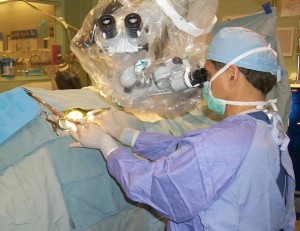How to Discuss Dementia with a Parent
 In a Series of Radio shows, Dr. Joseph Maroon’s colleague and physician assistant Jeff Bost PAC, presented information on Alzheimer’s disease and dementia related topics. In the series of radio shows are entitled, Healthy Living and Dementia Prevention. During this series Mr. Bost talks about the most common risk factors for dementia, what can be done to counter them and best ways to preserve brain function. The radio shows are sponsored by St Barnabas Health System (SBHS). Both Dr. Maroon and Mr. Bost are brain health advisors to SBHS.
In a Series of Radio shows, Dr. Joseph Maroon’s colleague and physician assistant Jeff Bost PAC, presented information on Alzheimer’s disease and dementia related topics. In the series of radio shows are entitled, Healthy Living and Dementia Prevention. During this series Mr. Bost talks about the most common risk factors for dementia, what can be done to counter them and best ways to preserve brain function. The radio shows are sponsored by St Barnabas Health System (SBHS). Both Dr. Maroon and Mr. Bost are brain health advisors to SBHS.
Session 4. How and when do family members discuss dementia with a parent or loved one with dementia symptoms?
Perhaps the toughest discussion a loved one needs to make is when to discuss cognitive decline in an older relative. Whether you are a close relative, like a spouse, daughter or son, or a close friend, there is always self-doubt and fear you might offend or anger the person. Forgetting the location of your car keys is annoying, but this alone does not necessarily mean you have dementia. Dementia is not a part of normal aging. This is why once you recognize signs in a loved one, getting help and a medical evaluation is critical. Changes related to age-related cognitive decline can be unique to the person and many people can learn to “hide” or adapt to their cognitive decline. One of the hallmarks of dementia is a lack of self-awareness and insight into the changes that are occurring. This is why families and friends are often the first to notice and to initiate the dementia discussion with their loved one.
In this segment we will discuss dementia-related behaviors that can be hidden. Additionally, what are the serious safety warning signs that must be acted on to speed proper medical evaluation and obtaining professional help will be reviewed.
Presenter – Jeff Bost PAC
Click HERE to Listen to Radio Interview Discussion for Session 1 (1/14/2021)
 HIGHLIGHTS
HIGHLIGHTS
It’s common to experience some issues with memory, thinking and behavior as we age. However, changes that interfere with daily life could be a sign of something more serious, such as dementia. Dementia is associated with not only a decline in memory but also other cognitive, sensory and emotional abilities that are severe enough to interfere with daily life. It is not a normal part of aging
One of the most common early signs of dementia is forgetting recently learned information (short-term memory). Others include forgetting important dates or events, asking the same questions repeatedly, and increasingly needing to rely on memory aids (e.g., reminder notes or electronic devices) or family members for things the person used to handle on their own.
Reference: Brochure from the Alzheimer’s Association on 10 Common Warning Signs)
Common Symptoms and Signs of Early Dementia
- Challenges in planning or problem-solving.
- Changes in mood and personality.
- Confusion with place or time.
- Difficulty completing familiar tasks.
- Memory loss that disrupts daily life.
- Misplacing objects.
- New problems with communication.
- Poor judgment.
- Trouble understanding spatial relationships and visual images.
- Withdrawal from social activities
Always consult a healthcare professional if any of these listed symptoms or signs occur. Not only could they diagnose dementia they may also determine if serous medical conditions or side effects of medications is the cause of the observed changes.
How to Talk to a Family Member or Friend about Dementia
- The conversation may not go as planned. Don’t force the conversation. Use a visit to their physician as a “honest-broker” to provide a professional opinion. St Barnabas is providing a FREE MEMORY CARE evaluation that is also available and will provide a profession opinion for you or a loved one.
- Sooner is better than later. Early intervention can help to slow symptoms and also help to prevent a later crisis.
- Let the person know you are there to help and support them.
- Plan ahead of time before the conversation. Let the person know why you are concerned (what changes you noticed) and have solutions to offer. Have locations and services researched, brochures and phone numbers available to call.
- Who should be part of the conversation and who is the leader? Too many people might make the situation more difficult. Agree ahead of time your position and plan you will take.
Reference: How to Talk to a Loved One
CLINICAL DISCLAIMER:
Disclaimer: Every effort has been made by the author(s) to provide accurate, up-to-date information. However, the medical knowledge base is dynamic and errors can occur. By using the information contained herein, the viewer willingly assumes all risks in connection with such use. Neither the josephmaroon.com website, the author, Beaver Radio, nor St Barnabas Health System or its affiliates shall be held responsible for errors, omissions in information herein nor liable for any special, consequential, or exemplary damages resulting, in whole or in part, from any viewer(s)’ use of or reliance upon, this material.
CLINICAL DISCLAIMER:
Clinical information is provided for educational purposes and not as a medical or professional service. Person(s) who are not medical professionals should have clinical information reviewed and interpreted or applied only by the appropriate health professional(s). (Read More HERE)




 Dr. Maroon received an athletic scholarship to Indiana University in Bloomington, Indiana where as an undergraduate, he was named a Scholastic All-American in football. Dr. Maroon has successfully maintained his personal athletic interests through participation in 9 marathons and more than 72 Olympic-distance triathlon events. However, his greatest athletic accomplishment is his participation in 8 Ironman triathlons (Hawaii – 1993, 2003, 2008, 2010, 2013; Canada – 1995; New Zealand – 1997; Germany – 2000), where he usually finishes in the top 10 of his age group. Recently, in July 2012 and 2013, he finished second and third, respectively, in his age group in the Muncie, Indiana half Ironman triathlon. In October 2013 he completed his 5th World Championship Ironman in Kona, Hawaii.
Dr. Maroon received an athletic scholarship to Indiana University in Bloomington, Indiana where as an undergraduate, he was named a Scholastic All-American in football. Dr. Maroon has successfully maintained his personal athletic interests through participation in 9 marathons and more than 72 Olympic-distance triathlon events. However, his greatest athletic accomplishment is his participation in 8 Ironman triathlons (Hawaii – 1993, 2003, 2008, 2010, 2013; Canada – 1995; New Zealand – 1997; Germany – 2000), where he usually finishes in the top 10 of his age group. Recently, in July 2012 and 2013, he finished second and third, respectively, in his age group in the Muncie, Indiana half Ironman triathlon. In October 2013 he completed his 5th World Championship Ironman in Kona, Hawaii.